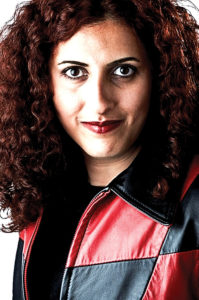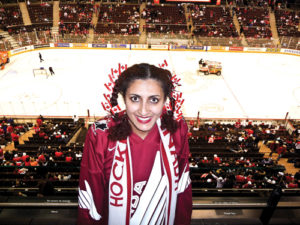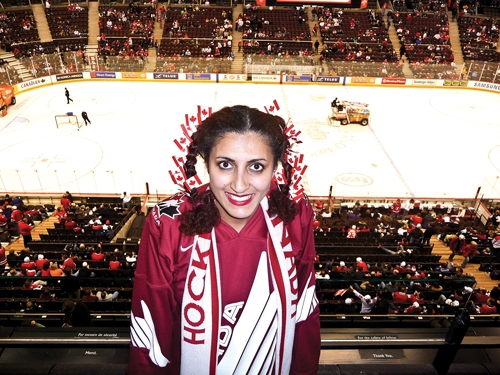Creative writing professor Priscila Uppal is helping to marry poetry and sport, through a sweeping worldwide movement
Damian Mangat
Staff writer
@excalweb
 When Priscila Uppal lived in her childhood home, she asked her father why she should attend Catholic school considering her Punjabi and Brazilian background. Now a novelist, a York professor, and “Canada’s coolest poet,” she recalls her father’s answer.
When Priscila Uppal lived in her childhood home, she asked her father why she should attend Catholic school considering her Punjabi and Brazilian background. Now a novelist, a York professor, and “Canada’s coolest poet,” she recalls her father’s answer.
“Well, I think Jesus was an alright guy,” he answered. “Whatever they teach you that he said, it can’t be all that bad.” She soon realized that all religion and art is storytelling and composes ways to find meaning. “This type of metaphorical thinking forms the basis of great thinking,” she explains in an interview.
Her desk is covered with ceramic nuns, librarian action figures, and gifts from creative writing students, some of whom arrived as nervous computer science majors and departed as Tennyson lovers.
“Art is a manufactured experience,” she says tracing the scratches on her neck—she has three cats, one named Virgil. “[One] tests life through art.” Her famous curly hennaed hair, worn in pigtails during her poet-in-residence post at the 2011 Vancouver Olympics, is tucked neatly into a bun. Her forward-leaning posture, steady unblinking gaze, and throaty chuckle exude that same curiosity.
Her mission is to transfer poetry across diverse disciplines in pedagogy by delivering verse to physiology majors, inciting elite hockey players to write haikus, and spotlighting the Arctic Games by translating sport into riveting performances of sound, motion, and language.
She has stirred her subjects, whether it be Para Olympians, children from the Canadian Tire writing workshop, or York kinesiology majors. Their reactions fascinate her.
“At first they were afraid,” says Uppal. “They didn’t know why this poet was here. ‘She’s reading us these poems about sport and I kinda like them.’ And you can see them struggling with identity issues and struggling with this course, with what they expected from the course and then them being grateful that they have this entirely new way of thinking about a subject that they had been involved in for years.”
These divisions between art and science find their roots in academic settings starting from the early stages, when classes were separated—a symptom which Uppal hopes to interrupt.
“People seem to think all the poets are almost anti-scientific and anti-rational, but I think there’s a lot to be gained in having discussions with the scientific world. That is something I’ve been trying to do,” says Uppal.
Uppal reflects on her position as the first CANFund poet-in-residence during the Vancouver Olympics and Paralympics, and the upcoming Roger’s Cup Tennis Tournament, as well as facilitator of the Bodyworks symposium at York which discovers intersections in sport, art, and culture. All of these projects marry poetry with science and sport.
“For me, this started happening over the past couple of years with sports because it’s an area I’m very interested in and I wanted to take that kind of stereotypical division between the jocks and the artsies, and show them that this didn’t need to be the case,” says Uppal. “You don’t have to make a division. You don’t have to pick one identity or the other. You can be interested in both.”

Iain McGillchrist, a poet, a world-renowned psychiatrist, and brain expert at Oxford, published This is Your Brain on Poetry and The Master and his Emissary.
“[He] challenges stereotypical points of view of what the left brain does versus what the right brain does,” says Uppal. She recently attended his Toronto lecture, and hopes to volunteer as a guinea pig for his experimentation on creativity centres. His research reevaluates traditional notions about learning.
Despite the ongoing debate between mind and body, and fact and imagination, poetry duplicates transferable cognitive and social skills that can be applied to any discipline. Creative writing enhances academic ability, in terms of unpacking language and inviting innovative thought. Every profession requires creativity, from managing people, solving equations, and even handling money.
“The nature of creativity is in many ways about adaptability,” says Uppal. “Being able to see that you can take one set of skills and transfer them, transform them in new ways to create other things.”
Since all learning is manipulated by metaphor, there are practical reasons to engage with poetry and develop language skills. Uppal says that poetry “makes students feel better,” and is a great exercise for warding off depression, which affects 50 per cent of our population.
“As we’re talking about more holistic lifestyles, talking about overall health, talking about balance, this is coming into play in research as well, people saying why are we keeping these discrete categories when we know that all life affects all other life. Why would we try and isolate what is biology from what is chemistry, from what is culture, from what is history? It’s all affected in each relationship.”
Uppal is just one of the York professors in favour of a mandatory creative course for undergraduates.
“It would be great if poets weren’t just ghettoized in the art world. For instance, there are tons of poets whose work would be completely in the appropriate venue if they were invited to speak at a political science class or geography class or biology class or a tech class.”


